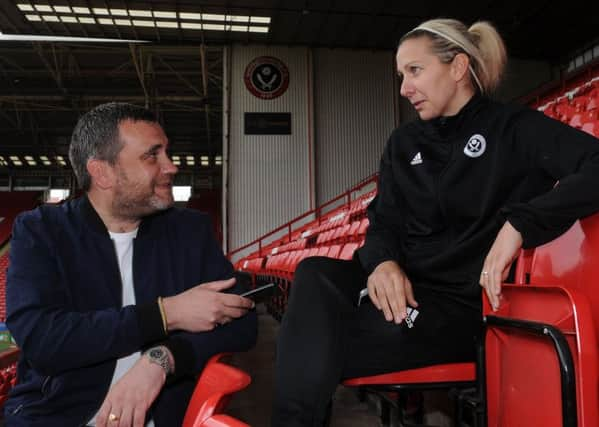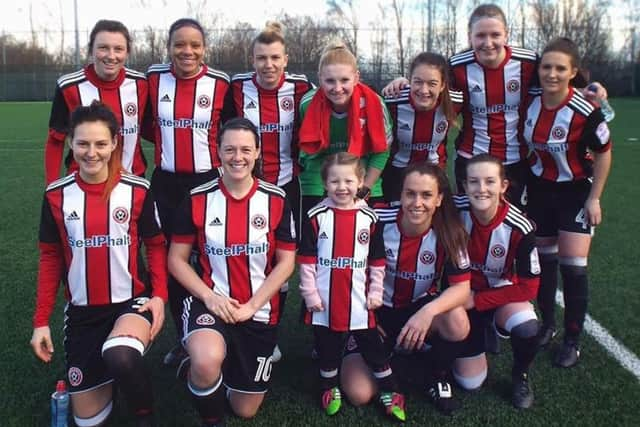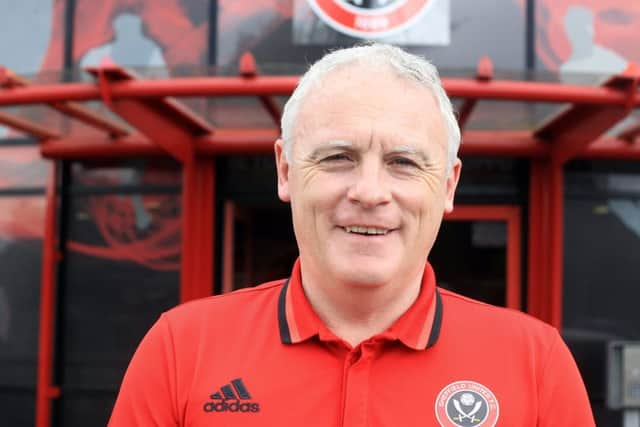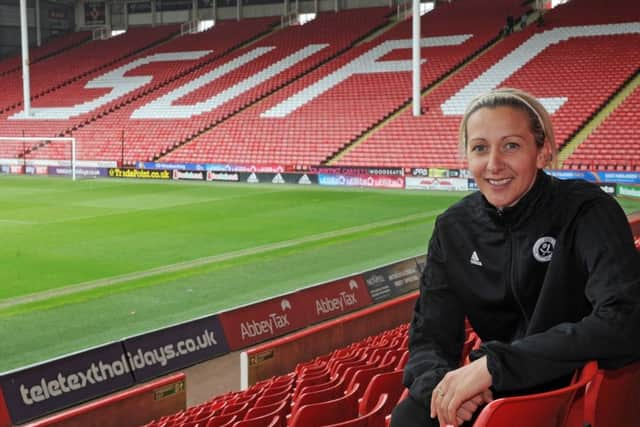Sheffield United: How one team's Championship celebrations did not go quite as they had planned


They probably envisaged a raucous bar crawl through Kelham Island, on to West Street and then the city’s other party hotspots.
But so much energy had been invested in the process, so tight was the secrecy surrounding the actual announcement that, after a few awkward moments in a packed hospitality lounge, those entrusted with the knowledge Sheffield United Ladies had just arrived in the big league settled for an early night instead.
Advertisement
Hide AdAdvertisement
Hide Ad

“I was mentally drained,” Carla Ward laughs, remembering the moment they were granted a Women’s Championship license. “I always thought, if we got it, things would get pretty wild. But because of the tension I was in bed by half-past-nine. There was no wild celebration.”
The mayhem, as she describes it, started just over twelve hours later when the Football Association’s decision began to filter out. As one of five new entrants in the revamped competition, now the second tier of the English game, United will compete against the likes of Tottenham Hotspur and Aston Villa next season. Their namesakes from Manchester, managed by England legend Casey Stoney, are also taking part. Derbies against Sheffield FC and Doncaster Belles add extra spice to a schedule which, with all due respect, is far more glamorous than last term’s jaunts to Radcliffe Olympic, Long Eaton and Sporting Khalsa.
Ward, Stoney’s counterpart at United, is sitting in Bramall Lane’s 1889 Suite as she reveals how the FA’s verdict was relayed. Earlier this month, moments after the stadium had staged a play-off final between Charlton Athletic and Blackburn Rovers, she was summoned to a room where Katie Brazier, one of the most senior figures in women’s football, had temporarily set-up camp. Chief executive Andy Birks and contract specialist Carl Schieber, also key players in United’s bid, squeezed alongside her on the couch.
“We were sat up here waiting,” Ward, glancing over her left shoulder, says. “Right there in fact. Most of the clubs who had applied were going to be told by telephone but, because everyone was here for the match anyway, they said we may as well find out face to face.
Advertisement
Hide AdAdvertisement
Hide Ad

“We got the message to go downstairs and everyone was there in Andy’s office. Katie started talking about our application, her face dropped, and so my stomach did too. Then she smiled and said we’d been accepted. I just grabbed her, gave her a cuddle, and then did the same to Carl.”
“It was tough because then, when we went back upstairs, everybody wanted to know,” Ward continues. “It was strictly embargoed until the next day which meant we couldn’t say a thing. The club captain was asking, the team captain was asking and my poker face is terrible. So I just said ‘let’s get out of here.’ It was so hard because all I wanted to do was jump up and down and drink champagne.”
Ward joined United in November following a distinguished and decorated career. Previously of Sheffield FC, where she scored more than 100 goals in 221 appearances, a conversation with co-owner Kevin McCabe proved the catalyst for her arrival. Impressed by his commitment to women’s football and decision to bring United’s Ladies under the club’s official banner, Ward initially became Dan O’Hearne’s assistant before taking charge when the latter stepped-down.
Although United’s elevation is cause for celebration, it brings greater responsibilities too.
Advertisement
Hide AdAdvertisement
Hide Ad

“Working for a professional club is great but it comes with a lot of pressure,” Ward admits. “Andy Birks has made that clear. We’ll be backed but with that comes with a responsibility to do what the club is asking. We have to make sure we get this right. We are representing Sheffield United so we must get this right. It’s a results business, the same as the men. The club treat us the same as the men and with that comes the same accountability and demands.”
Not all of which, Ward acknowledges, are especially palatable. A squad of friends as well as team mates will, given the step-up in class, inevitably experience seismic change.
“This week becomes a very difficult time for some people too. With us stepping up, changes happen. One (player) told me there’s going to be a lot of heartbreak but we’ll keep as many as we can in whatever capacity we can. A lot of them are big Blades fans and they are a credit to the club. So we’ll keep as many as possible. “I think we can keep half the squad in various different roles. Some can come through, definitely. Others can go into the development squad. Then there’s all sorts of other different positions and things that need to be done. Listen, when I first came in I got told they weren’t good enough. It was nonsense. They are all hungry, they are all eager to learn and they are all a credit to Sheffield United.”
Ward is consumed with excitement as she details both their response to last week’s proclamation and why, in her opinion, granting United Championship status made perfect sense. Particularly when you consider, in tandem with their community work, that United used to invest time and money developing young talent only to see it flourish elsewhere.
Advertisement
Hide AdAdvertisement
Hide Ad“Being at Sheffield FC for so many years, we always looked at United and the Regional Training Centre here and were baffled because, once the players had come through, they went to other clubs. It’s a great RTC and it’s produced players for England, Chelsea, Manchester City and Sheffield FC. Why would you spend that money to produce players for other people? Now, we’ve grabbed it back and one of the first things we’ve done it look at some of the people who have come through the RTC to see if we can bring them back as well.”
Despite the enthusiasm surrounding United, some people remain sceptical. Not least, Ward concedes, because the tendering process provoked a great deal controversy among some rival clubs.
“There was a bit or negativity. We are essentially jumping two leagues. I understand that. The FA have gone for sustainable clubs with backing.
“There are a couple of clubs who didn’t get in and I feel really sorry for them. I’m human. But I think, the things the FA were asking, they’ve done the right thing. One or two clubs had a little bit to say and obviously a few fans. But, for the most part, there was just positivity.
Advertisement
Hide AdAdvertisement
Hide Ad“A lot of people don’t know what was behind our bid. What we have got is a good model, a sustainable model and a model that can help us really try and do something in the women’s game.”
A key part of that blueprint is ensuring the ladies’ operation mirrors the men’s. Like Chris Wilder, Ward will spend the summer sifting through scouting reports and chasing targets. And, like Wilder, she now finds herself dealing with agents as United become a more attractive proposition for their clients.
“You bring in some players and say here’s the director of football, here’s the person who sorts out contracts,” Ward says. “Straight away they go ‘pardon?’ From board level down, they want to run the ladies like the men. It’s brilliant. It’s almost unheard of in women’s football.
“Behind the scenes, we’ve been working on this for a few months. We didn’t leave it until the announcement happened. The sooner we can get the squad sorted the better.”
Advertisement
Hide AdAdvertisement
Hide AdDespite the speed of developments, United have given themselves a head start. General manager Lee Walshaw recently outlined how they were preparing for elite level football long before the FA unveiled its overhaul. Ward, who once represented Spanish side S.P.A. Alicante, also began making plans midway during last season’s Women’s Premier League Midlands Division campaign.
“Abroad is a different ball game to here altogether,” he says. “We were full time in Spain. We trained every day, we had team get-togethers every day and there was a psychology to what we did too. My last 10 years, I’ve learnt a lot here too. Hopefully I bring that across. The girls will tell you a lot changed pretty quickly.
“The last six months, I’ve probably been working 50, 60, 70 hours a week. But listen, I’d probably do this for next to nothing.”
Competing in the Championship will bring greater exposure, improved standards and, Ward explains before departing for the first of umpteen meetings crammed into her diary, deliver immediate benefits for supporters too.
Advertisement
Hide AdAdvertisement
Hide Ad“There will be bigger crowds, more media interest and internationals on show. There will be some of the current squad as well. Basically, people will just be seeing some bloody good football in the city. Now people have got two options; Sheffield FC and us, Sheffield United.”
FROM ADVERSITY, COMES STRENGTH
Helping Sheffield United Ladies achieve FA Women’s Championship status represents a highpoint of Carla Ward’s career.
But their entrance into the game’s elite reminded her of a crushing low as well.
Nine years ago, Ward’s older brother Lee died in a car crash near the Spanish resort of Marbella. She received the devastating news during the build-up to a match but, recognising how he had encouraged her sporting ambitions, decided to play,
Advertisement
Hide AdAdvertisement
Hide Ad“The hardest part of my career was losing my brother,” Ward admits. “He was my biggest backer. He bought all my boots.
“We had a big game in Liverpool on the Sunday and, on the Saturday night, I got a call saying he’d died in a car accident. I didn’t sleep and stupidly drunk all night. The manager said I didn’t have to play but I knew he, my brother, would have been furious if I hadn’t.
“I got two quick goals and then missed the second half because I fell asleep at half-time. My other brother Glenn said to me the other day that Lee would have been so proud of what’s happening.”
Born on the Isle of Wight and raised in Devon, Ward’s footballing talents became apparent at an early age.
Advertisement
Hide AdAdvertisement
Hide Ad“I grew up on a council estate in Torquay and all the lads were out playing football,” she says. “From five or six, I was out there with them and never stopped. I always got told girls couldn’t play football and you still hear that a bit now. Basically, I just kicked on and ended up playing in the WSL.”
“When I was younger, I always wanted to be a footballer,” Ward adds. “But there was no real pathway. I’d fight with my brothers to watch Match on a Saturday because they wanted to watch some rubbish or whatever. People used to laugh at me but I always wanted to play football. Now, fortunately, the girls have got role models. There’s an opportunity for them to go and live that dream. That’s huge.”
ANOTHER HIGH POINT:
“Gaining promotion into the WSL with Sheffield FC was the high so far, other than this. We did it through a play-off. It was 90 minutes of mental torture but to win was amazing. I had opportunities to go elsewhere but I stuck with Sheffield FC and tried to take that route. That was my best day in football.”
ANOTHER LOW POINT:
“In 2013, I went up for a header, dropped down and felt a real pain in my back. I got told it was a sprained pelvis but a few days later I went back because I still couldn’t move. They took another look and then said I had to go and have emergency surgery on my back. The op had only 36 per cent success rate so, potentially, people were saying I’d never playing again. On day one of rehab with the spinal doctor, I told her I didn’t want to give up. I’m still in touch with her now because she did so much for my life.”
FA WOMEN’S CHAMPIONSHIP CLUBS:
Aston Villa, Doncaster Rovers, Durham, London Bees, Millwall, Sheffield FC, Tottenham Hotspur, Charlton Athletic, Leicester City, Lewes, Manchester United, Sheffield United.